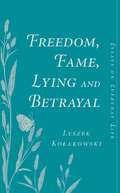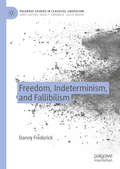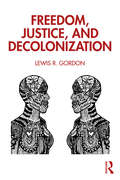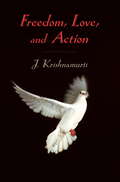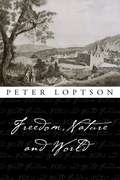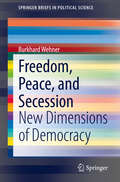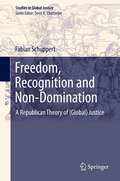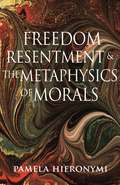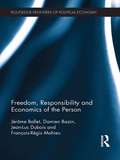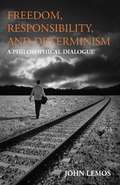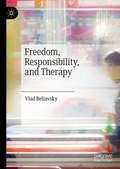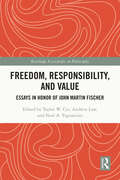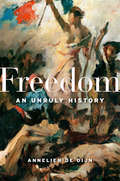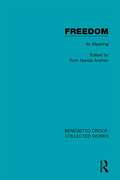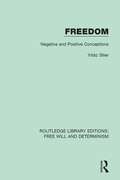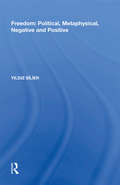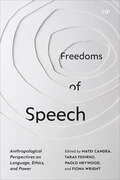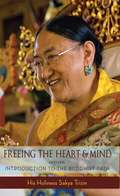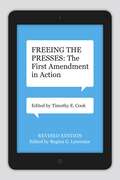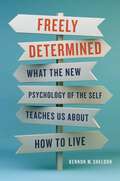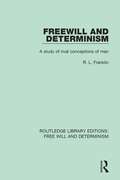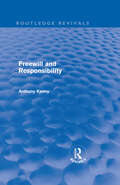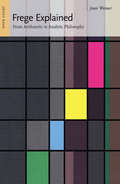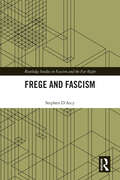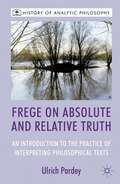- Table View
- List View
Freedom, Fame, Lying And Betrayal: Essays on Everyday Life
by Leszek KolakowskiPolish philosopher Leszek Kolakowski is renowned worldwide for wrestling with serious philosophical conundrums with dazzling elegance. <P><P> In this new book, he turns his characteristic wit to important themes of ordinary life, from the need for freedom to the wheel of fortune, from the nature of God to the ambiguities of betrayal. Extremely lucid and lacking in intellectual pretension, these essays speak in everyday language, spurring the reader's own thoughts and providing a handle on which to debate and think about the themes. The eighteen essays cover the following topics: power, fame, equality, lying, toleration, travel, virtue, collective responsibility, the wheel of fortune, betrayal, violence, boredom, freedom, luxury, God, respect for nature, superstition, and national stereotypes.
Freedom, Indeterminism, and Fallibilism (Palgrave Studies in Classical Liberalism)
by Danny FrederickThis book uses the concepts of freedom, indeterminism, and fallibilism to solve, in a unified way, problems of free will, knowledge, reasoning, rationality, personhood, ethics and politics. Presenting an overarching theory of human freedom, Frederick argues for an account of free will as the capacity for undetermined acts. Knowledge, rationality, and reasoning, both theoretical and practical, as well as personhood, morality and political authority, are all shown to be dependent at their roots on indeterminism and fallibility, and to be connected to individual freedom. Thought-provoking and original, Frederick’s theory of freedom examines a broad spectrum of issues, from the distinction between persons and other animals, to the purpose of the state and political authority. Offering a bold and succinct conspectus of the philosophy of freedom, this book makes surprising connections between perennial issues across the field of philosophy.
Freedom, Justice, and Decolonization
by Lewis R. GordonThe eminent scholar Lewis R. Gordon offers a probing meditation on freedom, justice, and decolonization. What is there to be understood and done when it is evident that the search for justice, which dominates social and political philosophy of the North, is an insufficient approach for the achievements of dignity, freedom, liberation, and revolution? Gordon takes the reader on a journey as he interrogates a trail from colonized philosophy to re-imagining liberation and revolution to critical challenges raised by Afropessimism, theodicy, and looming catastrophe. He offers not forecast and foreclosure but instead an urgent call for dignifying and urgent acts of political commitment. Such movements take the form of examining what philosophy means in Africana philosophy, liberation in decolonial thought, and the decolonization of justice and normative life. Gordon issues a critique of the obstacles to cultivating emancipatory politics, challenging reductionist forms of thought that proffer harm and suffering as conditions of political appearance and the valorization of nonhuman being. He asserts instead emancipatory considerations for occluded forms of life and the irreplaceability of existence in the face of catastrophe and ruin, and he concludes, through a discussion with the Circassian philosopher and decolonial theorist, Madina Tlostanova, with the project of shifting the geography of reason.
Freedom, Love, and Action
by Jiddu KrishnamurtiIn Freedom, Love, and Action, Krishnamurti points to a state of total awareness beyond mental processes. With his characteristic engaging, candid approach, Krishnamurti discusses such topics as the importance of setting the mind free from its own conditioning; the possibility of finding enlightenment in everyday activities; the inseparability of freedom, love, and action; and why it is best to love without attachment.
Freedom, Nature, and World (Philosophica)
by Peter LoptsonFreedom, Nature, and World is a collection of essays by Peter Loptson which examine issues posed by a broadly naturalistic view of the world, which Loptson defends while also exploring some of the challenges it confronts. Papers on freedom, Kant, Christianity, Homer, the history of analytic philosophy, the place of humanity in nature, and other topics, are brought together within a synoptically naturalistic purview. All the essays rest on, and in some cases extend, that synoptic perspective, which seeks to encompass both a scientific understanding of humankind in the natural world and the complexities of free rational agency within our cultural and historical settings.
Freedom, Peace, and Secession: New Dimensions of Democracy (SpringerBriefs in Political Science)
by Burkhard WehnerThis book adopts a long-term perspective to consider political self-determination, peacekeeping and the creation of political meaning. It analyzes problems in the nation-state system and assesses current issues regarding separatism and secession movements. Drawing on extensive research in the fields of political theory, democracy studies and social welfare, the book develops a framework of new rules on a fundamental level that can help nations overcome conflicts concerning borders and nationalities.
Freedom, Recognition and Non-Domination: A Republican Theory of (Global) Justice
by Fabian SchuppertThis book offers an original account of a distinctly republican theory of social and global justice. The book starts by exploring the nature and value of Hegelian recognition theory. It shows the importance of that theory for grounding a normative account of free and autonomous agency. It is this normative account of free agency which provides the groundwork for a republican conception of social and global justice, based on the core-ideas of freedom as non-domination and autonomy as non-alienation. As the author argues, republicans should endorse a sufficientarian account of social justice, which focuses on the nature of social relationships and their effects on people's ability to act freely and realize their fundamental interests. On the global level, the book argues for the cosmopolitan extension of the republican principles of non-domination and non-alienation within a multi-level democratic system. In so doing, the book addresses a major gap in the existing literature, presenting an original theory of justice, which combines Hegelian recognition theory and republican ideas of freedom, and applying this hybrid theory to the global domain.
Freedom, Resentment, and the Metaphysics of Morals (Princeton Monographs in Philosophy #46)
by Pamela HieronymiAn innovative reassessment of philosopher P. F. Strawson's influential "Freedom and Resentment"P. F. Strawson was one of the most important philosophers of the twentieth century, and his 1962 paper "Freedom and Resentment" is one of the most influential in modern moral philosophy, prompting responses across multiple disciplines, from psychology to sociology. In Freedom, Resentment, and the Metaphysics of Morals, Pamela Hieronymi closely reexamines Strawson's paper and concludes that his argument has been underestimated and misunderstood.Line by line, Hieronymi carefully untangles the complex strands of Strawson's ideas. After elucidating his conception of moral responsibility and his division between "reactive" and "objective" responses to the actions and attitudes of others, Hieronymi turns to his central argument. Strawson argues that, because determinism is an entirely general thesis, true of everyone at all times, its truth does not undermine moral responsibility. Hieronymi finds the two common interpretations of this argument, "the simple Humean interpretation" and "the broadly Wittgensteinian interpretation," both deficient. Drawing on Strawson's wider work in logic, philosophy of language, and metaphysics, Hieronymi concludes that his argument rests on an implicit, and previously overlooked, metaphysics of morals, one grounded in Strawson's "social naturalism." In the final chapter, she defends this naturalistic picture against objections.Rigorous, concise, and insightful, Freedom, Resentment, and the Metaphysics of Morals sheds new light on Strawson's thinking and has profound implications for future work on free will, moral responsibility, and metaethics.The book also features the complete text of Strawson's "Freedom and Resentment."
Freedom, Responsibility and Economics of the Person (Routledge Frontiers of Political Economy #175)
by Jérôme Ballet Damien Bazin Jean-Luc Dubois François-Régis MahieuThe capability approach has developed significantly since Amartya Sen was awarded the Nobel Prize in Economics in 1998. It is now recognised as being highly beneficial in the analysis of poverty and inequality, but also in the redefinition of policies aimed at improving the well-being of individuals. The approach has been applied within numerous sectors, from health and education to sustainable development, but beyond the obvious interest that it represents for the classical economics tradition, it has also encountered certain limitations. While acknowledging the undeniable progress that the approach has made in renewing the thinking on the development and well-being of a population, this book takes a critical stance. It focuses particularly on the approach’s inadequacy vis-à-vis the continental phenomenological tradition and draws conclusions about the economic analysis of development. In a more specific sense, it highlights the fact that the approach is too bound by standard economic logic, which has prevented it from taking account of a key ‘person’ dimension — namely, the ability of an individual to assume responsibility. As a result, this book advocates the notion that if the approach is used carelessly in relation to development policies, it can cause a number of pernicious effects, some of which may lead to disastrous consequences. Due to its multidisciplinary nature, this book will be of interest to those working in the fields of economics, philosophy, development studies and sociology.
Freedom, Responsibility, and Determinism: A Philosophical Dialogue
by John LemosJohn Lemos' Freedom, Responsibility, and Determinism offers an up-to-date introduction to free will (and associated) debates in an engaging, dialogic format that recommends it for use by beginning students in philosophy as well as by undergraduates in intermediate courses in metaphysics, philosophy of mind, and action theory.
Freedom, Responsibility, and Therapy
by Vlad BeliavskyThis book investigates the role of free will and responsibility in mental well-being, psychotherapy, and personality theory. Mounting evidence suggests that a belief in free will is associated with positive outcomes for human mental health and behaviours, yet little is known about why the theme of freedom has such a significant impact. This book explores why and how different freedom-related concepts affect well-being and psychotherapy, such as autonomy, free will, negative freedom, the experience of freedom, blame, and responsibility.Through the lens of the works of Freud and Rogers, the book tackles both theoretical and practical questions: How can different senses of responsibility affect mental health? What are the implications of a lack of free will for therapy? If we have no free will, can therapists continue to encourage their clients to take responsibility for their actions? Is it possible to reconcile different counselling schools concerning free will? With an illuminating dive into both philosophy and psychotherapy, Beliavsky carefully analyses the implications of the philosophical free will debate on therapy and shows that some senses of freedom and responsibility are crucial to psychotherapy and mental health.
Freedom, Responsibility, and Value: Essays in Honor of John Martin Fischer (Routledge Festschrifts in Philosophy)
by Neal A. Tognazzini Taylor W. Cyr Andrew LawThis volume celebrates the career of John Martin Fischer, whose work on a wide range of topics over the past 40 years has been transformative and inspirational. Fischer’s semicompatibilist view of free will and moral responsibility is perhaps the most widely discussed view of its kind, and his emphasis on the significance of reasons-responsiveness as the capacity that underlies moral accountability has been widely influential. Aside from free will and moral responsibility, Fischer is also well-known for his work on freedom and foreknowledge, the problem of evil, the badness of death, the meaning of life, and the allure of immortality. This volume gathers new essays by leading scholars on some of the major themes of Fischer's work, and it also includes a new piece by Fischer in which he offers a systematic reflection on and defense of the motivations that have shaped his theorizing about moral responsibility. Freedom, Responsibility, and Value will be of interest to scholars and students working on a variety of issues in metaphysics, ethics, and philosophy of religion.
Freedom: An Unruly History
by Annelien De DijnThe invention of modern freedom—the equating of liberty with restraints on state power—was not the natural outcome of such secular Western trends as the growth of religious tolerance or the creation of market societies. Rather, it was propelled by an antidemocratic backlash following the Atlantic Revolutions. We tend to think of freedom as something that is best protected by carefully circumscribing the boundaries of legitimate state activity. But who came up with this understanding of freedom, and for what purposes? In a masterful and surprising reappraisal of more than two thousand years of thinking about freedom in the West, Annelien de Dijn argues that we owe our view of freedom not to the liberty lovers of the Age of Revolution but to the enemies of democracy. The conception of freedom most prevalent today—that it depends on the limitation of state power—is a deliberate and dramatic rupture with long-established ways of thinking about liberty. For centuries people in the West identified freedom not with being left alone by the state but with the ability to exercise control over the way in which they were governed. They had what might best be described as a democratic conception of liberty. Understanding the long history of freedom underscores how recently it has come to be identified with limited government. It also reveals something crucial about the genealogy of current ways of thinking about freedom. The notion that freedom is best preserved by shrinking the sphere of government was not invented by the revolutionaries of the seventeenth and eighteenth centuries who created our modern democracies—it was invented by their critics and opponents. Rather than following in the path of the American founders, today’s “big government” antagonists more closely resemble the counterrevolutionaries who tried to undo their work.
Freedom: Its Meaning (Collected Works)
by Ruth Nanda AnshenOriginally published in 1942 this book brings together contribution from some of the finest thinkers and philosophers of the 20th century such as Boas, Croce, Einstein, Haldane, Mann, and Russell. The volume discusses the problem of Freedom from diverse points of view and offers a synthesis of issues and conclusions relating to freedom as a basis for action with a view to try and fill the gaps existent in the study of the nature of Man.
Freedom: Negative and Positive Conceptions (Routledge Library Editions: Free Will and Determinism #5)
by Yıldız SilierIsaiah Berlin made a now classic distinction between negative and positive conceptions of freedom. This book, first published in 2005, introduces a fresh way of looking at these conceptions and presents a new defence of the positive conception of freedom. Revealing how the internal debate between various versions of negative freedom give rise to hybrid conceptions of freedom which in turn are superseded by various versions of the positive conception of freedom, Silier concludes that Marx’s concrete historical account of positive freedom resolves many of the key debates in this area and provides a fruitful framework to evaluate the freedoms and unfreedoms that are specific to capitalism.
Freedom: Political, Metaphysical, Negative and Positive (Ashgate New Critical Thinking In Philosophy Ser.)
by Yildiz SilierIsaiah Berlin made a now classic distinction between negative and positive conceptions of freedom. In this book Yildiz Silier introduces a fresh way of looking at these conceptions and presents a new defence of the positive conception of freedom. Revealing how the internal debate between various versions of negative freedom give rise to hybrid conceptions of freedom which in turn are superseded by various versions of the positive conception of freedom, Silier concludes that Marx's concrete historical account of positive freedom resolves many of the key debates in this area and provides a fruitful framework to evaluate the freedoms and unfreedoms that are specific to capitalism. This book examines the thought of the paradigm thinkers in this debate, F.A. Hayek on negative freedom and T.H. Green on positive freedom and then ranges over the contributions to this debate made by both classical thinkers such as Kant, Hegel, and Marx, and those involved in contemporary debates on communitarianism, capitalism and self-determination, such as C. Taylor, D. Miller, F. Oppenheim and C.B. Macpherson.
Freedoms of Speech: Anthropological Perspectives on Language, Ethics, and Power (Studies in the Anthropology of Language, Sign, and Social Life)
by Fiona Wright Paolo Heywood Matei Candea Taras FedirkoBringing together leading anthropologists, this collection sheds light on the vast topic of freedoms of speech from a comparatively human perspective. Freedoms of Speech provides a sustained, empirical exploration of the variety of ways freedom of speech is lived, valued, and contested in practice; envisioned as an ideal; and mediated by various linguistic, ethical, and material forms. From Ireland to India, from Palestine to West Papua, from contemporary Java to early twentieth-century Britain, and from colonial Vietnam to the contemporary United States, the book broadly interrogates the classic vision of a singular “Western liberal tradition” of freedom of speech, exploring its internal complexities and highlighting alternative perspectives on the relationship between speech, freedom, and constraint in other times and places. Chapters analyse subjects commonly linked to freedom-of-speech debates, shedding new light on familiar topics that include campus speech codes, defamation, and press freedom, while also exploring unexpected ones such as therapy, gift-giving, and martyrdom. These analyses not only provide unexpected perspectives and unique insights but also address a myriad of questions, contributing to a rich, interdisciplinary, and human understanding of the nature of freedom of speech.
Freeing the Heart and Mind
by Khenpo Kalsang Gyaltsen His Eminence Sakya Trizin Ani Junga ChodronHis Holiness Sakya Trizin, the head of the glorious Sakya lineage, one of the four primary schools of Tibetan Buddhism, presents here the essential Buddhist teachings of the four noble truths, universal compassion, and the proper motivation for practice. This book opens by sharing a private teaching His Holiness gave to a young newcomer seeking to understand this great master's spiritual heritage. His Holiness's advice inspires us to integrate the living power of these teachings into our daily lives. Full of timeless wisdom, Freeing the Heart and Mind contains, in addition to this introduction, an explanation of the teaching Matchless Compassion by the Indian saint Virupa, and a selection of commentaries on the essential teaching called Parting from the Four Attachments. Developed as the first volume in a course of study for students of the Sakya tradition, it nonetheless stands alone as an excellent entry into the teachings of the Buddha. Freeing the Heart and Mind includes a full-color photo insert of Sakya lineage masters.
Freeing the Presses: The First Amendment in Action (Media & Public Affairs)
by Regina G. Lawrence Timothy E. Cook"A thoughtful, provocative, and timely account of the meaning of a free press in the United States." -- American Journal of Political ScienceMost Americans consider a free press essential to democratic society -- -either as an independent watchdog against governmental abuse of power or as a wide-open marketplace of ideas. But few understand that far--reaching public policies have shaped the news citizens receive. With contributions from leading scholars in the fields of history, legal scholarship, political science, and communications, this revised and updated edition of Freeing the Presses offers an in-depth inquiry into the theory and practice of journalistic freedom. In addition to a new foreword by Regina G. Lawrence and afterword by Laura Stein, Freeing the Presses presents fresh and timely analyses of the complexities of news media and politics.
Freely Determined: What the New Psychology of the Self Teaches Us About How to Live
by Kennon M SheldonA renowned psychologist argues that free will is not only real but essential to our well-being It&’s become fashionable to argue that free will is a fiction: that we humans are in the thrall of animal urges and unconscious biases and only think that we are choosing freely. In Freely Determined, research psychologist Kennon Sheldon argues that this perception is not only wrong but also dangerous. Drawing on decades of his own groundbreaking empirical research into motivation and goal setting, Sheldon shows us that embracing the ability to choose our path in life makes us happier, healthier, and more fulfilled. He also shows that this insight can help us choose better goals—ones that are concordant with our values and that, critically, we&’re more likely to actually see through. Providing readers insight into how they can live a more self-directed, satisfying life, Freely Determined offers an essential guide for how we might recognize our freedom and use it wisely.
Freewill and Determinism: A Study of Rival Conceptions of Man (Routledge Library Editions: Free Will and Determinism #7)
by R.L. FranklinThis book, first published in 1968, examines the complicated issues which surround the problem of freewill. Although it reaches a libertarian conclusion, its focus is largely on other questions. What ultimately is at stake in this debate? What difference would it make whether we had freewill or not? Why must disagreement persist, and why do philosophes each opposed conclusions with such confidence? The answers to these questions open new perspectives.
Freewill and Responsibility (Routledge Revivals)
by Anthony KennyThis reissue was first published in 1978. Anthony Kenny, one of the most distinguished philosophers in England, explores the notion of responsibility and the precise place of the mental element in criminal actions. Bringing the insights of recent philosophy of mind to bear on contemporary developments in criminal law, he writes with the general reader in mind, no specialist training in philosophy being necessary to appreciate his argument.Kenny shows that abstract distinctions drawn by analytic philosophers are relevant to decisions in matters of life and death, and illustrates the philosophical argument throughout by reference to actual legal cases. The topics he covers are of wide general interest and include: mens rea and mental health, strict liability, freedom and determinism, duress and necessity, intoxication and irresistible impulse, intention and purpose, murder and rape, punishment and deterrence, witchcraft and supernatural beliefs.
Frege Explained
by Joan WeinerWhat is the number one? How can we be sure that 2+2=4? These apparently ssimple questions have perplexed philosophers for thousands of years, but discussion of them was transformed by the German philosopher Gottlob Frege (1848-1925).Frege (pronounced Fray-guh)believed that arithmetic and all mathematics are derived from logic, and to prove this he developed a completely new approach to logic and numbers. Joan Weiner presents a very clear outline of Frege's life and ideas, showing how his thinking evolved through successive books and articles.
Frege and Fascism (Routledge Studies in Fascism and the Far Right)
by Stephen D'ArcyThis book is the first to examine in minutiae the politics of Gottlob Frege (1848–1925), and his connections with various traditions of far-right and fascist thought.Frege was a philosopher of logic, language, and mathematics. But he also believed that one could reconcile the politics of the far right with a firm commitment to reason-guided inquiry and scientific objectivity. The fundamental claim of the text is that Gottlob Frege was, from the early 1890s to the mid-1920s, an anti-democratic, nationalist political thinker and that his political thought eventually took on a fascist character. This book makes no attempt to vilify or demonize Gottlob Frege, nor does it try to rescue him from criticism. It simply seeks to tell the truth about Frege’s descent into fascism: to document it in hitherto unprecedented detail; to situate it in the context of intellectual and political debates in early Weimar-era Germany; and to explain how it could have happened that someone so intelligent and so manifestly devoted to reason and logic could have embraced fascism with such unreserved enthusiasm.Frege and Fascism will be of interest to scholars of analytic philosophy, intellectual history, fascism, and anti-democratic thought.
Frege on Absolute and Relative Truth
by Ulrich PardeyThis book has two objectives: to be a contribution to the understanding of Frege's theory of truth - especially a defence of his notorious critique of the correspondence theory - and to be an introduction to the practice of interpreting philosophical texts.
